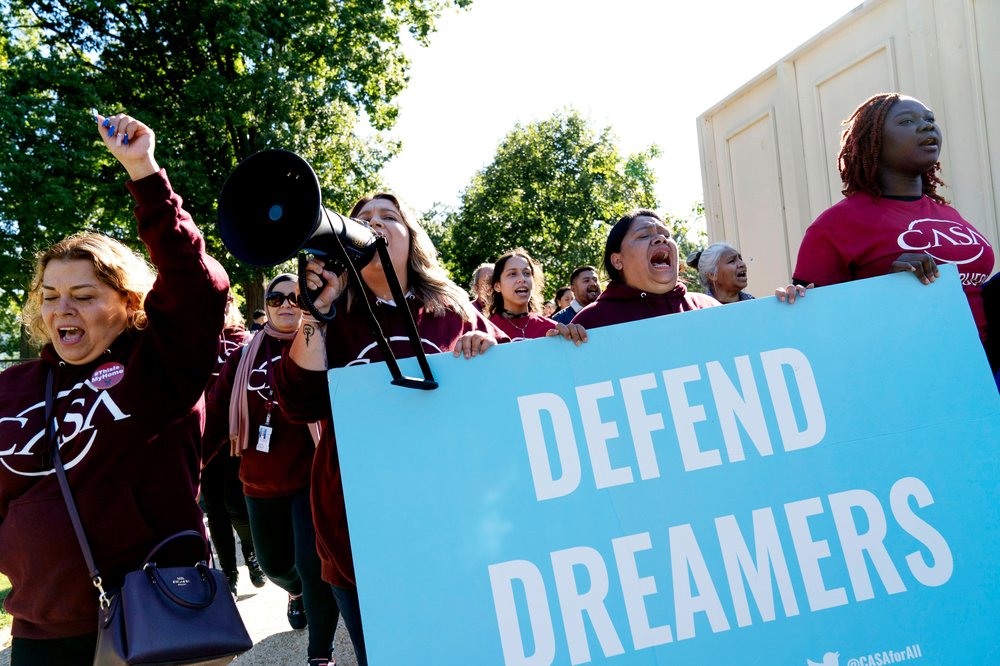For New York City 'dreamers,' now is the time to act on immigration reform
Oct. 11, 2022, 6 a.m.
A federal appeals court ruling has cast fresh doubt on the Obama-era program that allows young immigrants to live, work and study in the United states without facing removal.

New York “dreamers” and their advocates say they're disappointed but undaunted by last week’s federal appeals court ruling that cast fresh doubt on a program that protects some 600,000 to 800,000 young immigrants from deportation.
The ruling by the Fifth Circuit Court of Appeals upheld a district court ruling out of Houston that found the Deferred Action for Childhood Arrivals program, or DACA, was illegal. Nonetheless, the court still allowed the migrants, brought to this country unlawfully as minors, to renew their DACA status for now – in effect maintaining the status quo.
“This lack of permanency is terrible,” said Hina Naveed, 32, a Staten Island-based lawyer who was born in Pakistan and received protection under DACA in 2013. “Not knowing where you’re going to be in two years, or whether you’re going to be removed from a country that you feel is your home.”
Immigration advocates said the ruling provides fresh impetus for Congress to pass legislation backing DACA, which applies to migrants who were under the age of 31 as of June 15, 2012; came to the U.S. while under the age of 16; and have continuously resided in the U.S. from June 15, 2007 to present. City officials say about 150,000 “dreamers,” as DACA recipients are known, live the five boroughs.
This lack of permanency is terrible. Not knowing where you’re going to be in two years, or whether you’re going to be removed from a country that you feel is your home.
Hina Naveed, New Yorker and DACA recipient
Stephen Yale-Loehr, a professor of immigration law practice at Cornell Law School, said immigrant rights advocates are “working hard behind the scenes” to get legislation passed after the midterm elections.
“One possible legislative package might include DACA plus border security reforms,” said Yale-Loehr.
'Substantive defects'
While affirming the lower court ruling that DACA was unlawful, the appellate court opinion also recognized that DACA “has had profound significance to recipients and many others in the 10 years since its adoption.”
It returned the case to the district court in Texas for consideration of a new administration policy aimed at preserving DACA – effectively giving program advocates more time to push Congress to act on the DACA protections.
The program was created in 2012 by President Barack Obama after repeated attempts to take up immigration reform stalled, even where there was bipartisan support. The program – originally cast as a stopgap measure pending congressional action – survives despite repeated legal blows from the courts. Former President Donald Trump tried to dismantle the protection but was unsuccessful.
All DACA recipients were minors when they were brought to the U.S., and some are too young to have known any other country. The average age of a DACA recipient was 28.2 years in March, up from 23.8 in September 2017, the Migration Policy Institute reported in September.
DACA recipients must renew their protection every two years.
“DACA’s deficiencies are severe,” said the appeals court in its decision, noting “fundamental substantive defects in the program.”
'Failure at every level'
Murad Awawdeh, the executive director of the New York Immigration Coalition, said it was unclear if Democrats would be able to hold their current “trifecta” of power over the White House and both houses of Congress beyond the midterms.
“So now’s the time for President Biden and Congress to step up and finally pass a legalization effort to give all of our undocumented brothers and sisters across the U.S. a pathway to residency and citizenship in this moment,” said Awawdeh, saying it required “political courage” of Democrats.
Naveed, the Staten Island resident, said her family moved to the U.S. from the United Arab Emirates when she was 10, in order to procure medical treatment for her sister, whose life was “in jeopardy” after she’d received brain surgery. Since then, Naveed’s completed nursing school and law school and now hopes to pursue family law.
The fact that lawmakers had still not given "dreamers" permanent legal status, she said, despite a lapse of 10 years since DACA was created, “is a reminder of the failure at every level but especially at the federal level for our elected officials to get it together.”